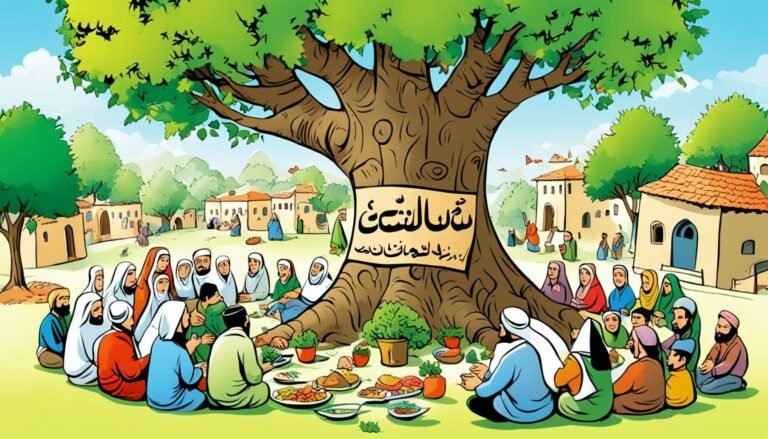5 Everyday Ethical Dilemmas and Islam’s Solutions
Have you ever thought about how Islamic ethics can help with today’s moral challenges? In a world where it’s hard to tell right from wrong, Muslims face tough choices. These choices test their faith and values, no matter where they are.
Islamic ethics act as a guide through life’s complex situations. They mix religious teachings with today’s problems. The Quran and Sunnah light the way, helping Muslims make choices in business and personal life.
In the U.S. and Europe, over 25 million Muslims deal with these tough decisions. They try to live their faith in places where Islamic values are not common. This requires wisdom, courage, and a strong grasp of Islamic teachings.
Key Takeaways
- Islamic ethics provide guidance for everyday moral dilemmas
- The Quran and Sunnah are primary sources for ethical decision-making
- Muslims worldwide face unique challenges in applying Islamic ethics
- Balancing religious principles with modern contexts is crucial
- Ethical dilemmas touch various aspects of life, from business to healthcare
Understanding Islamic Ethics in Modern Context
Islamic ethics are at the heart of a Muslim’s life. They are based on the Quran and Sunnah teachings. These principles guide us through today’s complex world.
The importance of Islamic guidance in daily life
Islamic principles shape a believer’s life in every way. They guide our decisions, interactions, and actions. The Quran helps us know right from wrong.
Balancing religious principles with contemporary challenges
Muslims face special challenges today. Technology brings benefits but also raises ethical questions. Islamic ethics help us deal with these issues. They focus on justice, goodness, and stopping bad actions.
The role of Quran and Sunnah in ethical decision-making
The Quran and Sunnah are key to Islamic ethics. They teach us about important ethical ideas:
- Ma’ruf (approved actions)
- Khayr (goodness)
- Haqq (truth and right)
- Birr (righteousness)
- Adl (justice)
These teachings help us make good choices in our personal and work lives. They encourage honesty, morality, and improving society.
“The best among you are those who have the best manners and character.” – Prophet Muhammad (PBUH)
By following Islamic principles, Muslims can face today’s challenges while staying faithful. This balance is crucial for an ethical life in our world.
The Islamic Worldview and Moral Philosophy
The Islamic worldview guides Muslims everywhere. It centers on tawḥīd, or the belief in one God. This belief is key to making ethical choices in Islam.
Humans, according to Islam, are Earth’s caretakers. This role gives us both responsibility and freedom. The Quran teaches us about our relationship with God and with each other.
Great thinkers like Miskawayh, al-Iṣfahānī, and al-Ghazālī have enriched Islamic ethics. They combined faith and reason in their teachings.
“If anyone saved a life, it would be as if he saved the life of all mankind.” – Quran
This saying shows Islam’s value for human life. It helps Muslims make good choices in healthcare and business.
The Islamic worldview encourages:
- Seeking knowledge and understanding
- Balancing personal rights with community duties
- Decisions based on faith and reason
By following these values, Muslims can face today’s ethical challenges. They do so while staying faithful to their beliefs.
Ethical Dilemma: Following the Crowd vs. Standing Firm
In today’s world, personal ethics often clash with societal pressures. Muslims face moral dilemmas when deciding between following the crowd or standing firm in their Islamic principles. This struggle is particularly evident in light of recent global events and statistics.
The Concept of Imma’ah in Islam
Islam warns against being an Imma’ah – someone who blindly follows others in both good and bad actions. This concept is crucial in navigating ethical challenges, especially when confronted with peer pressure or societal norms that conflict with Islamic teachings.
Quranic Teachings on Steadfastness
The Quran provides guidance on remaining firm in one’s principles. It encourages believers to stand strong in their faith, even when faced with adversity. This strength is vital in today’s world, where statistics show a concerning trend of violence and discord among Muslim communities.
“So stand firm and steadfast in the way that you have been commanded.” (Quran 11:112)
Practical Steps to Overcome Peer Pressure
To overcome peer pressure and uphold personal ethics, Muslims can:
- Strengthen their knowledge of Islamic principles
- Surround themselves with like-minded individuals
- Practice self-reflection and accountability
- Seek guidance from trusted religious scholars
By focusing on these steps, Muslims can navigate moral dilemmas with confidence. They can align their actions with their faith while contributing positively to their communities.
5 Everyday Ethical Dilemmas and Islam’s Solutions
Muslims often face moral challenges in their daily lives. These issues test their commitment to Islamic values. They arise in various areas, from business to personal actions, and need thoughtful solutions based on religious teachings.
In business, profit sometimes conflicts with moral values. Some Muslim companies might sell alcohol or pork to compete. However, Islamic teachings say that our sustenance is already decided. This view questions the idea that wrong actions bring financial success.
In schools, another ethical problem exists. There have been cases where tax evasion was accepted until legal issues arose. Islam stresses the need for honesty and integrity, especially in financial dealings.
- Avoiding doubtful matters
- Questioning unethical orders
- Considering public perception of decisions
Islamic teachings offer guidance for these challenges. The rule of avoiding doubtful actions helps Muslims avoid unethical choices. This rule is similar to a CEO who checks if their decisions would be okay if everyone knew about them.
“The halal is clear and the haram is clear, and between them are matters that are doubtful which many people do not know.” – Prophet Muhammad (PBUH)
By applying Islamic ethics in everyday life, Muslims can handle moral dilemmas confidently. This approach ensures personal integrity and helps build a more ethical society.
Ethical Dilemma: Profit vs. Principles in Business
In the world of commerce, Islamic ethics are key in shaping business practices. Muslim entrepreneurs must balance making money with doing the right thing. This is a tough challenge that requires careful thought and decision-making.
Islamic Perspective on Rizq (Sustenance)
Islam teaches that our sustenance comes from Allah. This belief pushes Muslims to act ethically in business. They avoid doing things that are wrong, even if they might make more money.
The Quran says that doing wrong won’t bring more sustenance in the end.
Balancing Financial Gain with Ethical Conduct
Islamic ethics cover many areas of life, including business. Fiqh gives specific rules for ethical business actions. The ideas of halal (lawful) and haram (prohibited) are at the heart of Islamic business ethics.
This framework helps Muslim entrepreneurs deal with the challenges of modern business. They can stay true to their faith while succeeding.
Examples of Ethical Muslim Businesses
Many Muslim-owned businesses put principles first, not just making money. They focus on actions that are good for people and society. Islam sees these actions as morally right.
For example, some companies are very careful about the environment. Others make sure workers are treated fairly in their supply chains.
- Eco-friendly product manufacturers
- Fair trade coffee roasters
- Ethical investment firms
By following Islamic ethics, these businesses show it’s possible to succeed financially without losing moral values. Their actions also match the growing focus on Environmental, Social, and Governance (ESG) issues. These issues are now a big deal for corporate boards around the world.
Challenging Cultural Norms: The Case of Hijab
The hijab is a symbol of Islamic values and personal ethics. Muslim women who wear it often face challenges in Western societies. A study found that 68% of North American Muslim women experienced discrimination or harassment because of their hijab.
Wearing hijab can lead to tough situations. For example, 47% of hijab-wearing women reported facing discrimination because of their religious clothing. They were often met with derogatory comments or were excluded from social events. These experiences show how cultural norms and religious practices can clash.
Choosing to wear hijab is a deeply personal decision, based on faith. However, it can cause tension in some social settings. Some women feel forced to remove their hijab at special events, like weddings. This shows the conflict between cultural norms and religious beliefs.
“Wearing hijab made me more aware of my faith and actions. It’s a constant reminder of my values,” shared a Muslim woman in the study.
Islam teaches believers to be reformers in society. This starts with making personal choices and setting an example. By staying true to their beliefs, Muslim women can challenge misconceptions and promote understanding. Their commitment to wearing hijab can be a powerful way to bring about social change.
Despite the challenges, many find strength in their faith. The hijab becomes a way for them to express their identity and values. It shows their dedication to Islamic principles in their everyday lives.
Ethical Dilemma: Legal Compliance vs. Moral Integrity
Islamic ethics help Muslims deal with legal rules and moral values. This issue often comes up at work. Here, following the law might clash with what one believes is right.
Islamic Teachings on Honesty and Transparency
Islam values honesty and openness in all actions. The Quran and Sunnah guide Muslims to choose moral integrity over just following the law.
Dealing with Unethical Practices in the Workplace
Recent scandals show the need for ethics in business. Toshiba’s $1.22 billion scandal and PT Garuda Indonesia’s financial issues remind us of the harm of putting profits first.
- Recognize unethical practices
- Speak up against wrongdoing
- Seek guidance from Islamic teachings
The Importance of Fearing Allah Over People
Prophet Muhammad taught that obeying Allah is more important than obeying people. This is key when facing tough choices. Muslims should fear Allah more than others, even if it means standing up against wrongdoings at work.
“And fear Allah. Indeed, Allah is Acquainted with what you do.” – Quran 5:8
By following Islamic ethics and moral teachings, Muslims can handle the mix of legal rules and moral values. They make choices that match their faith and values.
The Ripple Effect: Small Actions and Their Consequences
Islamic teachings show us that small actions can make a big difference. Our daily choices, though small, can lead to big moral dilemmas. For example, saying thank you at work can make employees 25% more motivated.
This shows how our actions affect others. It’s a powerful lesson in the workplace.
Muslims are taught to think about the big picture of their decisions. Being mindful of waste at work can cut it by 10%. This follows Islamic values of taking care of the Earth and its resources.
“The best of people are those who are most beneficial to others.” – Prophet Muhammad (peace be upon him)
In Islam, we’re responsible for our small choices. Doing kind acts at work can make teamwork 30% better. This shows the importance of building good relationships and a united community.
Every small act of kindness helps make the world a better place.
Here are some ways to make a positive impact:
- Offer sincere compliments to coworkers
- Choose sustainable products
- Participate in community service
- Stay informed about social issues
By following Islamic values and our personal ethics, we can face moral challenges and make a difference. Every action we take is seen by Allah.
Navigating Gray Areas: Islamic Guidance on Doubtful Matters
In our daily lives, we often face situations where the right choice isn’t clear. Islamic ethics provide a framework for ethical decision-making in these gray areas. The Quran guidance offers wisdom on how to approach doubtful matters.
Understanding Halal and Haram
Islam categorizes actions as halal (permissible) or haram (forbidden). But what about the space between? A study by the Yaqeen Institute for Islamic Research found 7,750 items related to Islamic guidance, showing the depth of resources available for navigating ethical dilemmas.
The Role of Intention in Islamic Ethics
Intention plays a crucial role in Islamic ethics. The Prophet Muhammad emphasized its importance in decision-making. Of the 7,750 items studied, 383 focused on acts of worship, highlighting the significance of intention in spiritual practices.
Steps for Decisions in Uncertain Situations
When faced with ethical dilemmas, consider these steps:
- Seek knowledge from reliable sources
- Reflect on the potential consequences
- Consult with knowledgeable individuals
- Make dua (supplication) for guidance
Remember, 169 items in the study focused on understanding Allah, underlining the importance of seeking divine guidance in ethical decision-making.
“Leave that which makes you doubt for that which does not make you doubt.” – Prophet Muhammad
By following these principles and seeking Quran guidance, we can navigate gray areas with confidence and uphold Islamic ethics in our daily lives.
Ethical Decision-Making in Healthcare: An Islamic Perspective
Islamic ethics are key in healthcare choices. Muslims look for treatments but know Allah is the ultimate healer. This view influences their medical care and handling of tough decisions.
In Islam, saving lives is a top priority. The Quran highlights the importance of human life. Prophet Muhammad also urged finding cures for illnesses. Islamic law classifies treatments as necessary, preferred, optional, discouraged, or forbidden, depending on the situation and its success.
When faced with tough healthcare choices, Muslims seek guidance from the Quran and Sunnah. These teachings offer a way to make ethical decisions. They blend religious values with medical ethics.
“God has created treatments for all diseases except for senility.” – Prophet Muhammad
Islamic medical ethics match the four main principles of biomedical ethics: respect for autonomy, doing good, avoiding harm, and fairness. Yet, they have different focuses than Western bioethics.
In cases of life’s end, Islamic law allows stopping treatments that won’t help. The goal then is to keep the patient comfortable and dignified. Healthcare workers must handle these cases with care, respecting both faith and medical standards.
As medical education grows, Islamic ethics are being taught more. This is especially true in clinical years. Teaching Islamic ethics helps students develop their moral thinking and behavior. It prepares them to face complex moral challenges in their careers.
Implementing Islamic Ethics in Daily Life
Living by Islamic principles in our daily lives is a powerful way to nurture personal ethics and moral philosophy. Muslims strive to embody these values in every aspect of their lives, from work to family relationships. The journey of implementing Islamic ethics is both rewarding and challenging, requiring dedication and constant self-improvement.
Practical tips for ethical living
To put Islamic ethics into practice, start by focusing on the six key areas of preservation: faith, life, mind, progeny, honor, and property. These form the foundation of ethical decision-making in Islam. For example, preserving life means not only avoiding harm to others but actively promoting well-being. Similarly, preserving honor involves maintaining dignity and respect in all interactions.
The role of self-reflection and accountability
Self-reflection plays a crucial role in ethical growth. Muslims are encouraged to evaluate their intentions (niyya) regularly, as deeds are judged based on intentions in Islam. This practice of self-accountability helps align actions with Islamic teachings and fosters continuous moral development.
Building a supportive community for ethical growth
Creating a supportive community is essential for sustaining ethical practices. In Islamic communities, the norm of justice prevails, encouraging members to speak up against injustice and correct wrongdoings. This collective commitment to ethical living strengthens individual resolve and promotes a society built on Islamic principles.
Source Links
- Ethical Dilemmas at the End of Life: Islamic Perspective – Journal of Religion and Health
- Answers to Frequently Asked Questions About Islam – ING
- Common Workplace Dilemmas facing Muslims
- Islamic Ethics and The Rise of Digital Technology – Maydan
- Being a "Good Person" is Not Enough: Why Ethics Need Islam | Yaqeen Institute for Islamic Research
- The Worldview of Islamic Philosophy
- Western and Islamic bioethics: How close is the gap?
- Islamic Ethics and Psychology | CILE
- Sam Harris | The Bright Line Between Good and Evil
- Opinion | Conversations and insights about the moment.
- Microsoft Word – Adab Ikhtilaf.doc
- Islam & Ethical Decisions | Virtual Mosque
- The Ethical Worldview of the Qur’an | Yaqeen Institute for Islamic Research
- The Ethical System in Islam – Implications for Business Practices
- Business Versus Ethics? Thoughts on the Future of Business Ethics
- Cultural Competence in the Care of Muslim Patients and Their Families – StatPearls
- Hijab, Gendered Islamophobia, and the Lived Experiences of Muslim Women | Yaqeen Institute for Islamic Research
- How do healthcare professionals respond to ethical challenges regarding information management? A review of empirical studies
- No title found
- The Transformative Power of Ramadan: Lessons for the Soul and Leadership
- The Profound Impact of Your Daily Actions: How Every Choice Shapes Our World
- Gray Areas and Doubtful Matters (al-Shubhat, Mashbuh, Mashkuk)
- How Do I Deal With Doubts (Part 3) | Yaqeen Institute for Islamic Research
- Introduction to Islamic Medical Ethics | Journal of the British Islamic Medical Association
- 2 In Search of Principles of Healthcare Ethics in Islam
- American Journal of Islam and Society
- Morality & Ethics in Islam5 min read
- The Origins of Islamic Morality and Ethics – Contemporary Bioethics







